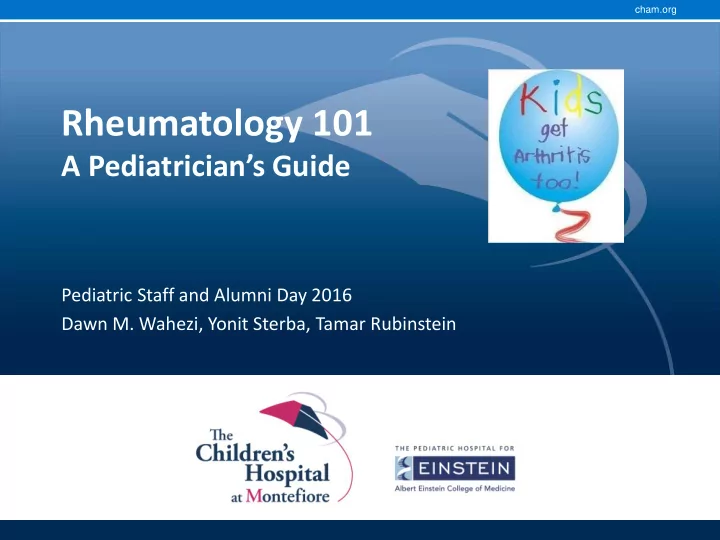

cham.org Rheumatology 101 A Pediatrician’s Guide Pediatric Staff and Alumni Day 2016 Dawn M. Wahezi, Yonit Sterba, Tamar Rubinstein
cham.org Disclosures • None
cham.org Pick a Group • Group 1 – A child with a limp • Group 2 – ANA – To test or not to test! • Group 3 – Picture time! Who would you send to a Pediatric Rheumatologist?
cham.org Group 1 A child with a limp
cham.org Group 1 - Case 2 yo white female is brought to your office because her mother says for the past 6 weeks, she has limped every morning for about 45 minutes. She does not have any current fever or rash, but her mother does report that she had a “cold” one month ago.
cham.org Question 1 What findings in the history suggest that this is true arthritis? What would you like to know about her exam to help make this distinction?
cham.org True arthritis • Arthalgia vs arthritis – Morning preponderance – Stiffness/limp > 30 minutes – Improves with activity • Definitions – Non-bony swelling OR – Two of the following: • Pain • Warmth • Limited ROM • +/- Erythema • Signs of chronic disease – Atrophy, leg length discrepancy
cham.org Question 2 What is the differential diagnosis for monoarthritis in this child? What additional investigations would you like to do?
cham.org Differential • • Acute onset < 6 weeks: Chronic > 6 weeks: • • Infectious Rheumatologic – Septic – JIA (oligo, PsA, ERA) – Lyme – SLE – ARF/PRSA – Sarcoidosis – Parvovirus – Other • • Trauma Infectious • – Tuberculosis Malignancy • • Hemophilia Malignancy Initial work-up: CBC, ESR/CRP, Lyme, ASLO, Parvo IgG/IgM
cham.org Question 3 You suspect that this patient may have JIA. What are the subtypes of JIA and which ones do you suspect in this patient?
cham.org Juvenile Idiopathic Arthritis • Definition: • Categories: • • Arthritis of unknown etiology Oligoarthritis > 50% • – Persistent In a child < 16 years old • – Extended Persists over 6 weeks • • Must rule out other causes Polyarthritis ~20% – Rheumatoid Factor Negative Rheumatoid Factor Positive • Systemic Arthritis ~10% • Enthesitis Related Arthritis (ERA) What percentage of polyarticular JIA ~10% patients will have a positive RF? • Only 15%! Psoriatic Arthritis (PsA) ~10% • Undifferentiated Arthritis
cham.org Joint distribution
cham.org Question 4 What major comorbidity is associated with JIA and how does it manifest itself? What are risk factors for this comorbidity?
cham.org Anterior Uveitis • Acute uveitis – Erythema, pain and photophobia – ERA • Chronic uveitis – Minimally symptomatic – Oligo JIA, PsA • Complications: – Cataracts – Glaucoma – Synechiea – Band Keratopathy Risk Factors: ANA+, age < 7, female, early in dx (< 4 years)
cham.org Group 2 ANA – To test or not to test!
cham.org Group 2 What are the 3 major indications for screening a patient with an ANA?
cham.org ANA testing - Indication # 1 • True arthritis > 6 weeks – ANA determines uveitis risk in JIA – May be a presentation of SLE
cham.org ANA testing – Indication # 2 • Raynaud phenomenon – Primary vs Secondary – SLE, JDM, Scleroderma • Abnormal nailbed capillaroscopy highly suggestive of underlying rheumatologic disease
cham.org Raynaud Phenomenon
cham.org ANA testing – Indication # 3 A RASH POINts MD • A rthritis • O ral ulcers • R enal disease • I mmunologic disorder • A NA positive • N eurologic symptoms • S erositis • M alar rash • H ematologic disorder • D iscoid rash • P hotosensitivity
cham.org What percentage of healthy patients can have a positive ANA? 20 to 30%!
cham.org Positive ANA • Immunoflorescence: Homogeneous Peripheral reported as a titer and staining pattern – Serial dilutions of patient’s serum the higher the titer, anti-dsDNA anti-dsDNA, anti-histone the more dilutions needed to eliminate detection of antibody – Pattern of nuclear immunofluorescence suggests anti-Smith, anti-RNP, anti-centromere anti-Ro (SSA), anti-La (SSB) type of antibodies present in Speckled Nucleolar patients serum
cham.org Group 3 Picture time! Who would you send to a Pediatric Rheumatologist?
cham.org Who should see a pediatric rheumatologist? B A E D C
cham.org Gottron’s papules
cham.org Who should see a pediatric rheumatologist? B A E D C
cham.org Mucocutaneous Manifestations of SLE
cham.org Who should see a pediatric rheumatologist? B A D C
cham.org Vasculitis
cham.org Who should see a pediatric rheumatologist? B A C
cham.org Neonatal lupus
cham.org Thank You!
Recommend
More recommend